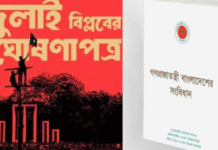Justice for Renu
Delay in filing charge sheet unacceptable

Justice for a victim of “mob justice” may sound like an oxymoron for those uninitiated in the fundamental principles of law, but it is not—and for Taslima Begum Renu, the struggle for justice remains as real as the day she died, six months ago, in the hands of a bloodthirsty mob. Renu remains a painful reminder of what happens when individuals take it upon themselves to mete out “justice” or when the existing legal system fails to protect the innocents. According to a report by this daily, the 40-year-old had gone to Badda last July to inquire about the admission process of a local school when a crowd apparently suspected her of being a child-lifter. So they beat her mercilessly until she was dead. The incident caused quite a stir then, especially after videos of the grisly attack went viral on social media. Six months on, however, initial probe into the matter seems to have hit a roadblock. No charge sheet has been filed either.
We are at a loss to describe the trauma and sufferings that Renu’s family has gone through since. Renu’s two children now live with their aunt, while her former husband occasionally visits them. The youngest of the two, barely four years old, doesn’t even know her mother is dead. As the investigation drags on, and the case risks being tossed around among different departments of the law enforcement, the family also risks being twice victimised: first Renu’s murder, now a long shadow over their life cast by the uncertain legal journey.
Unfortunately, Bangladesh’s brush with such violence is neither new nor infrequent, although cases of mob beatings seldom, if ever, end in conviction. According to Ain o Salish Kendra, between 2011 and June of 2019, some 826 people were killed in mob beatings across the country. During this period, the highest number of killings was recorded in 2015 (135), while Dhaka was witness to the highest number of deaths (350). The number of people killed in 2019 was 65, according to another ASK report. Experts have often cited lack of faith in the criminal justice system and lack of its conviction rates as potential reasons for such incidents. But as stories of victims like Renu show, the tragedy doesn’t end with their deaths. It goes on to scar their loved ones too, possibly for the rest of their life. It is the state’s responsibility to end this disturbing cycle and compensate the victim’s family for the losses suffered. We also urge the authorities to ensure swift trial of the Renu case so that the family is sparred the additional pain of a costly, protracted legal battle and the culprits are brought to justice. This will also send a message to all that mob justice can’t—and won’t—go unpunished.









